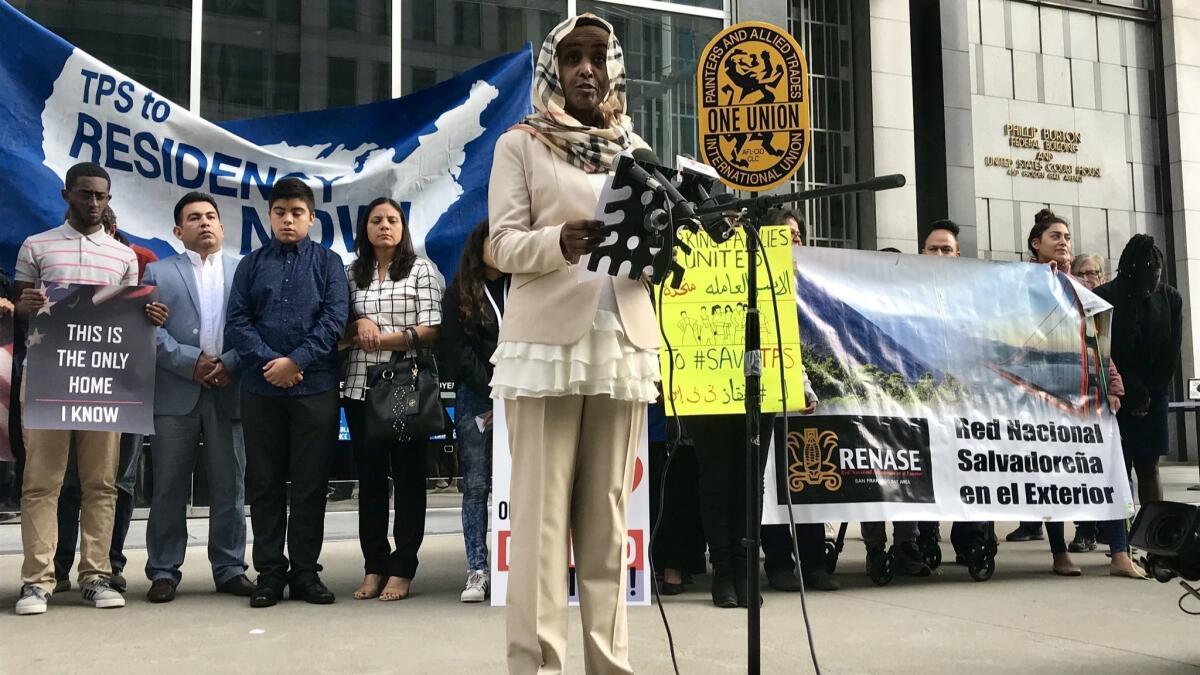San Francisco judge suspends Trump administration’s decision to end protected status for hundreds of thousands of immigrants

- Share via
A U.S. district judge in San Francisco has dealt a blow to the Trump administration’s decision to rescind temporary protected status for hundreds of thousands of immigrants.
The ruling late Wednesday afternoon will relieve immigrants from El Salvador, Haiti, Nicaragua and Sudan from the threat of deportation.
It came in response to a class-action lawsuit alleging that government officials approached their decisions about TPS with a political agenda, ignored facts and were motivated by racism.
Administration officials deny those allegations, saying the program was never intended to provide a long-term reprieve.
Judge Edward Chen wrote that without court intervention, TPS beneficiaries, many of whom have built lives of more than a decade in this country, would be subject to removal.
“Absent injunctive relief, TPS beneficiaries and their children indisputably will suffer irreparable harm and great hardship,” Chen wrote. “Many have U.S.-born children; those may be faced with the Hobson’s choice of bringing their children with them (and tearing them away from the only country and community they have known) or splitting their families apart.”
Chen said the government had failed to prove that any harm would come from maintaining the status quo.
The American Civil Liberties Union of Southern California, the National Day Laborer Organizing Network and the law firm of Sidley Austin LLP filed the lawsuit in March. It sought to stop the termination of TPS protections for immigrants from El Salvador, Sudan, Nicaragua and Haiti, who make up the majority of the more than 300,000 total beneficiaries. Nearly 200,000 recipients are from El Salvador.
Ramos v. Nielsen was filed in the Northern District of California.
At a Sept. 25 hearing, lawyers asked the judge to temporarily block the terminations so that residents of the affected countries won’t be deported while the case plays out in court. More than 1,000 Sudanese immigrants would have been at risk of deportation if the first scheduled TPS termination took place Nov. 2.
TPS is a form of humanitarian relief granted to countries devastated by natural disasters or war that allows beneficiaries to work legally while they remain in the U.S. Created in 1990, the program applies to people from 10 countries.
But the Trump administration has announced the termination of TPS for 98% of those who have it. After the lawsuit was filed, Trump also cancelled TPS for Honduras and Nepal.
Chen acknowledged that three previous administrations had repeatedly extended TPS designations based on dangerous conditions in the countries. He said the plaintiffs showed substantial evidence that acting Homeland Security Secretary Elaine Duke illegally changed the criteria without any justification.
Lawyers for the federal government have said they are merely emphasizing different factors in weighing whether to extend protections.
Chen said the plaintiffs also raised serious questions about whether the decision was “influenced by the White House and based on animus against non-white, non-European immigrants,” in violation of the Constitution.
Justice Department spokesman Devin O’Malley said the court’s decision usurps the role of the executive branch.
“The Justice Department completely rejects the notion that the White House or the Department of Homeland Security did anything improper,” he said. “We will continue to fight for the integrity of our immigration laws and our national security.”
Ahilan Arulanantham, senior counsel at the ACLU Foundation of Southern California, called the ruling a victory against the unlawful and cruel dismantling of a humanitarian program that prevented the separation of hundreds of thousands of U.S. citizen children from their immigrant parents.
“If these children’s parents were not from countries the administration considers unworthy of humanity, we would not have to wage this fight,” Arulanantham said. “But we do, and we will not relent.”
andrea.castillo@latimes.com
Twitter: @andreamcastillo
UPDATES:
8:45 p.m.: This article was updated with more details from the ruling and reactions from the Justice Department and the ACLU.
This article was originally published at 6:45 p.m.
More to Read
Sign up for Essential California
The most important California stories and recommendations in your inbox every morning.
You may occasionally receive promotional content from the Los Angeles Times.














